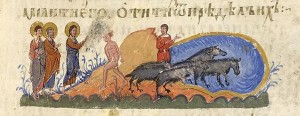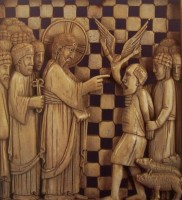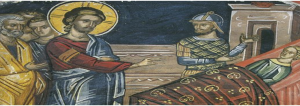The light of the body is the eye: if therefore the eye be single, the whole body shall be full of light. But if thy eye be evil, thy whole body shall be full of darkness. If therefore the light that is in thee be darkness, how great is that darkness? No man can serve two masters: for either he will hate the one, and love the other; or else he will hold to the one, and despise the other. Ye cannot serve God and mammon. Therefore I say unto you, take no thought for your life, what ye shall eat, or what ye shall drink, nor yet for your body, what ye shall put on. Is not the life more than meat, and the body than raiment? Behold the fowls of the air: for they sow not, neither do they reap, nor gather into barns, yet your heavenly Father feedeth them. Are ye not much better than they? Which of you by taking thought can add one cubit unto his stature? And why take ye thought for raiment? Consider the lilies of the field, how they grow: they toil not, neither do they spin. And yet I say unto you, that even Solomon in all his glory was not arrayed like one of these. Wherefore, if God so clothe the grass of the field, which today is, and tomorrow is cast into the oven, shall He not much more clothe you, O ye of little faith? Therefore take no thought, saying, What shall we eat? or, What shall we drink? or, Wherewithall shall we be clothed? (for after these things do the Gentiles seek): for your heavenly Father knoweth that ye have need of all these things. But seek ye first the kingdom of God, and His righteousness, and all these things shall be added unto you (Matthew 6:22-33).
 In the Name of the Father, and of the Son, and of the Holy Spirit!
In the Name of the Father, and of the Son, and of the Holy Spirit!
Today, on this Sunday, the Gospel reading is about what we really need in life, about what our real requirements are. In this Gospel, the Lord offers several images or comparisons, saying: The light of the body is the eye: if therefore thy eye be single, thy whole body shall be full of light. But if thy eye be evil, thy whole body shall be full of darkness (Matthew 6:22-23).
Here the Lord offers us three images.
First, the Lord speaks about the eyes, about how important it is for them to see all that is full of light, for then the whole body will be full of light. If the eyes only look for good, then the whole person will be good and light. But if the eyes are darkened, then the whole person will be blackened.
The second image compares the eye with a lamp. A lamp dispels the darkness around it and gives light to any quarter – and the eye should do likewise for the body.
The Lord implicitly offers us a third image, that of the mind. If our mind be full of light, then all the remaining powers of the soul will likewise be full of light. If, on the contrary, our mind be darkened, then our entire soul will become dark and gloomy.
This is the first instruction the Lord gives us today: we should seek not only visible light, but also the spiritual light that would illumine our mind and thereby our soul as well.
Next the Lord warns us against avarice, saying: Take no thought for your life, what ye shall eat, or what ye shall drink; nor yet for your body, what ye shall put on (Matthew 6:25). Here He identifies two kinds of avarice. There are people who fall into the sin of avarice and begin to gather money. This form of avarice is called greed. Moreover, people who gather money give way to greed to such an extent that they are afraid to spend their money, so seized are they by this passion. There is another form of avarice, when one does not simply gather money, but hastens to spend it on mundane pleasures, thereby falling into spiritual dissipation. Both are dangerous. The Lord calls this “mammon,” saying: No man can serve two masters: for either he will hate the one, and love the other; or else he will hold to the one, and despise the other. Ye cannot serve God and mammon (Matthew 6:24). Here the Lord is speaking about the qualities of our heart, that it is impossible to unite love for God with love for earthly riches. Moreover, there is also the risk that this “mammon” might not even be riches, but even a small amount of money. The Lord forewarns us, by giving us – as though we were little children – various images and comparisons. He comforts, instructs, and upholds us, saying: Behold the fowls of the air: for they sow not, neither do they reap, nor gather into barns; yet your heavenly Father feedeth them (Matthew 6:26). If He feeds the birds, surely He can feed us as well. What a vivid comparison, invigorating and admonishing us!
The Lord also says: Consider the lilies of the field, how they grow; they toil not, neither do they spin: And yet I say unto you, That even Solomon in all his glory was not arrayed like one of these. Wherefore, if God so clothe the grass of the field, which to day is, and to morrow is cast into the oven, shall He not much more clothe you, O ye of little faith? (Matthew 6:28-30). Here again the Lord instructs and comforts by making a comparison, saying that we, of course, are better than birds or ephemeral flowers. Moreover, the Lord calls us to break away from corrupt, earthly concerns that are vain and sinful, and to direct our gaze to the surrounding world that He created.
The most important thing is to see that God is present in everything in this world: He gives thought to birds and flowers of the field. But, brothers and sisters, when the Lord offers us these comparisons, He is also cautioning us against another extreme. When He offers us these examples of the birds of the heavens or flowers, He does not want us, once we have heard these examples, to stop doing anything, sit down, fold our hands, and say: “That’s it, Lord! Now You will take care of us, and we’ll put aside all earthly cares.” No, nothing of the sort! The Lord certainly does not want us to wilt like these wildflowers. Indeed, their lifespan at time lasts only days or hours, but this does not mean that we should imitate flowers by stopping and doing nothing. Nor are we to be like birds that fly about at random, as they please, and do nothing else. The Lord guards us from extremes, and is certainly not calling upon us to do nothing.
Therefore, today’s Gospel proclamation concludes with these sobering words: But seek ye first the kingdom of God, and His righteousness; and all these things shall be added unto you (Matthew 6:33). Amen.
Delivered on July 3, 2011, at the New Jerusalem Monastery.

















